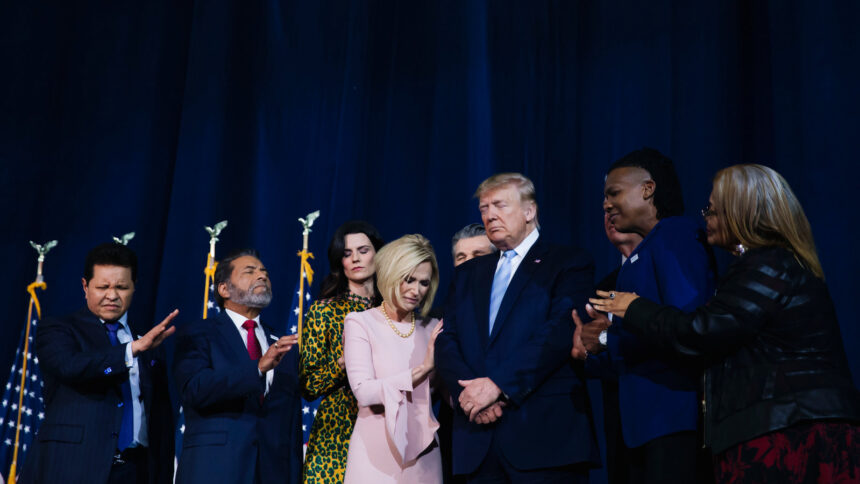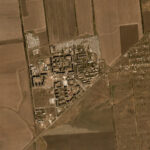(Image source: Eric Thayer for the New York Times)
The day after the 2020 election, before news outlets officially called the presidential race for Joe Biden, a woman got up in her church to preach. Petite, blonde, fashionably dressed, she spoke with the verve and cadence of a gifted televangelist enrapturing a crowd. Stamping her foot and intermittently speaking in tongues, she called for angels from Africa and South America—“angelic reinforcements”—to come to the United States to help assure that Donald Trump would be declared victorious.
That preacher was Paula White-Cain, personal pastor to then-President Trump and chair of his Evangelical Advisory Board. She was also, at the time, a paid White House staffer, leading Trump’s Faith and Opportunity Initiative.
The news stories and academic articles that took note of this episode—often mockingly—chalked it up as a potent example of “Christian nationalism” or, as it’s commonly rendered, “white Christian nationalism.” In American political discourse today, these phrases are usually invoked as though they are uniquely American phenomena. Yes, Paula White-Cain is white, and she does espouse Christian nationalism. But in the background of this ecstatic scene and this pastor’s story lies a radical, ascendant, Independent Charismatic paradigm of Christian nationalism that is neither bounded by American shores nor exclusively inhabited by white Christians. It’s a story that may or may not involve angels transferring between continents, but it definitely involves transcontinental webs of relationships among Christian leaders from North America, Africa, and South America.
Though counterintuitively more transnational, racially diverse, and gender inclusive than other forms of Christian nationalism, this insurgent force in the American religious right should not leave us sleeping more calmly at night. Indeed, the Independent Charismatic style of Christian nationalism that Paula White-Cain and Donald Trump have helped usher into the mainstream of the American right was a driving force in the January 6th Capitol Riot, and it is powering Trump’s third (ever more authoritarian) bid for the White House.
Paula White-Cain, therefore, serves as a useful entry point into understanding the globally attuned charismatic Christian movement that has furnished the spirituality of Christian Trumpism.
The Wild West of Modern Christianity
The phrase “Independent Charismatic” probably sounds obscure to many, so it’s worth pausing to consider the structure and environs of this incipient segment of global Christianity. “Charismatic” here describes a form of Christian belief and practice focused on recapturing the supernatural dimensions of early Christianity, where speaking in tongues, miracles, and prophecy abound. This charismatic subculture feels like home to hundreds of millions of people around the globe but feels utterly foreign to many who locate themselves within the European and North American cosmopolitan mainstream.
Independent Charismatics are the rowdy, unregulated cousins of the Pentecostals, those Holy Spirit-filled, revivalist denominations of modern Christianity. Additionally, there’s a thriving global trend today of Catholics adopting effusive charismatic spirituality. Supreme Court Justice Amy Coney Barrett was raised in such a community.
But the key characteristic that sets Independent Charismatics apart from these other types is that they are nondenominational. The Independent Charismatics occupy the Wild West of modern Christianity: a free-flowing culture of perpetual new frontiers. Scholars estimate that there were approximately 44 million Independent Charismatics in the world in 1970, but by 2020 they numbered 312 million. That means that, globally, Independent Charismaticism has been roughly doubling in numbers every 20 years, making it one of the fastest growing religious movements ever.
Two features of this global charismatic trend have proven central to the Christian embrace of Donald Trump: 1) a highly networked leadership culture and 2) the aggressive politics of “spiritual warfare.”
For many Christians, “nondenominational” signals the absence of structure (to “denominate” is, literally, to name or categorize), but church governance, like nature, abhors a vacuum. In lieu of institutional superstructure, the entrepreneurial Independent Charismatic leadership culture that has emerged in the past few decades is collaborative and intricately networked. Independent Charismatic leaders go by many titles—pastor, apostle, evangelist, prophet, televangelist, Messianic rabbi, worship leader, revivalist—but they all work together. And among the thousands of global, top-tier nondenominational charismatic pastors and leaders, there is rarely more than two degrees of separation. These webs of relationships among the leaders weave together charismatic movements around the world.
One of the central organs of this leadership culture is a relatively new model of church governance called apostolic networks. The concept emerges from a modern reinterpretation of Ephesians 4, where the biblical author lists five ministry gifts Jesus gave to the church: apostles, prophets, evangelists, pastors, and teachers. In the past century, many charismatic leaders began seeing this passage, with its five differentiated roles, as the central New Testament template for church leadership. Though it’s at great variance from how most Christians think of church, the proponents of this “fivefold” or “apostolic and prophetic” model argue that this was the original arrangement of the early church and should be restored now.
In this fivefold model, modern apostles are network-building luminaries whose authority and vision surpasses that of congregation-bound pastors. Apostles offer guidance and oversight to vast coalitions of churches and ministries. Prophets are divinely gifted oracles who hear and speak God’s word, giving supernatural insights to the apostles and the churches under their imprimatur. Within the past 40 years, thousands of churches in the U.S. (hundreds of thousands around the world) have either left their denominations or abandoned their congregational autonomy to join apostolic networks.
The second distinctive feature of Independent Charismatics, as it relates to Christian nationalism, is their high-octane vision of spiritual warfare. “Spiritual warfare” refers to a popular Christian belief in an invisible war going on all around us between angels and demons. Many evangelical, Pentecostal, and Catholic Christians participate in spiritual warfare, using practices like prayer or exorcisms to join the battle against the multitudinous devils and their diabolical agenda to derail Christian faith and thwart God’s purposes on Earth.
Independent Charismatics put these spiritual warfare practices on steroids. Through various correlated revelations from their prophets and new readings of old Bible passages, they have developed elaborate vocabularies and protocols for battling demons. Blowing shofars (ritual rams’ horns that were originally used in Jewish liturgical services), singing worship music, and even dancing can all serve as weapons of spiritual warfare. And they often describe their apostles and prophets as generals of spiritual warfare: divinely appointed leaders with enough authority to take on even the most high-ranking demonic “principalities and powers.” Spiritual warfare is part of the grammar of Independent Charismatic culture, and to even dip your toes into this pulsing subculture is to be drawn into the drama of cosmic combat.
From “Messed Up Mississippi Girl” to Pastor to the President
That context brings us back to Paula White-Cain’s invocations for angels from Africa and South America to aid President Trump. This self-described “messed up Mississippi girl” typifies—and has helped shape—the American branch of this global Independent Charismatic trend.
Born Paula Michelle Furr in Tupelo, Mississippi in 1966, Paula’s early life was marked by escalating tragedy and trauma. After her father’s apparent suicide by car crash when Paula was five years old, her mother took to drinking heavily, and Paula, barely in elementary school, was often left to care for herself.
In her autobiographical books, she recounts numerous sexual and physical abuses she endured from caregivers, relatives, and neighbors. She developed bulimia and characterizes herself at eighteen as “an old soul,” blind to all but “the hopeless carnage of today.”
Then Paula found Pentecostalism. In her late teens, she began dating a singer in a local Maryland rock band, Dean Knight. When she became pregnant unexpectedly, they quickly married and began attending the Pentecostal Church of God where Knight had been raised. The raw devotion and euphoric experiences of Pentecostal piety resonated deeply with Paula, therapy for her wounded soul, and she thought, “This is me.”
But within a few years, their marriage was on the rocks, and Paula fell in love, instead, with the associate pastor of the church, Randy White. Randy was married with three kids, eight years her elder, a fifth-generation Pentecostal preacher, and the son of the senior pastor.
The ensuing scandal of Pastor Randy and Paula both divorcing their spouses to marry each other pretty much ended Randy’s career in the denomination. Denominations have guidelines, strictures, and accountability measures for ordained clergy, and they tend to frown on pastors getting divorced to marry a younger—and mid-divorce—congregation member.
In the face of denominational scrutiny and communal disgrace, Randy and Paula White reinvented themselves and moved to Tampa, Florida in 1991 to start their own church. Their new endeavor was charismatic and nondenominational, and they named it Without Walls International Church.
Without Walls was founded on the cusp of a flood of American megachurches (Protestant churches with more than 2,000 regular attendees), and it rode the rising tide. Their church attracted more than 700 attendees within the first year of opening. By 2006, when Paula turned 40, they had more than 20,000 members, making it one of the largest churches in America. What quickly became evident was that Randy might have the pastoral pedigree, but Paula was the breakout talent.

(Paula White-Cain with Donald Trump. Image source: Chip Somodevilla for Getty Images)
The Whites’ burgeoning megachurch, like the larger Independent Charismatic sector, was startlingly multiethnic — 30 percent white, 30 percent Latino/a, and 40 percent Black. Recognizing her potential, T.D. Jakes, a popular, up-and-coming Black charismatic preacher, offered to mentor Paula.
She soon got a televangelism show of her own on the Black Entertainment Television (BET) network. Her show was explosively popular, eschewing many conventional televangelism tropes in favor of raw, honest conversations where Paula could speak from her own traumatized past and draw guests into sharing similar stories. A sociologist and a historian who’ve studied her ministry have argued she “represents a nonconfrontational style of postfeminist leadership.”
One day in 2002, out of the blue, Paula received a phone call from famed real estate mogul Donald Trump. He had seen her preaching on television and told her, “You have the it factor.” Paula, half-jokingly rejoindered, “Sir, we call that the anointing.” White and Trump became friends, and she viewed the New York celebrity as “a spiritual assignment” from God. She would visit Trump when she was in New York, and she eventually bought a Source link






